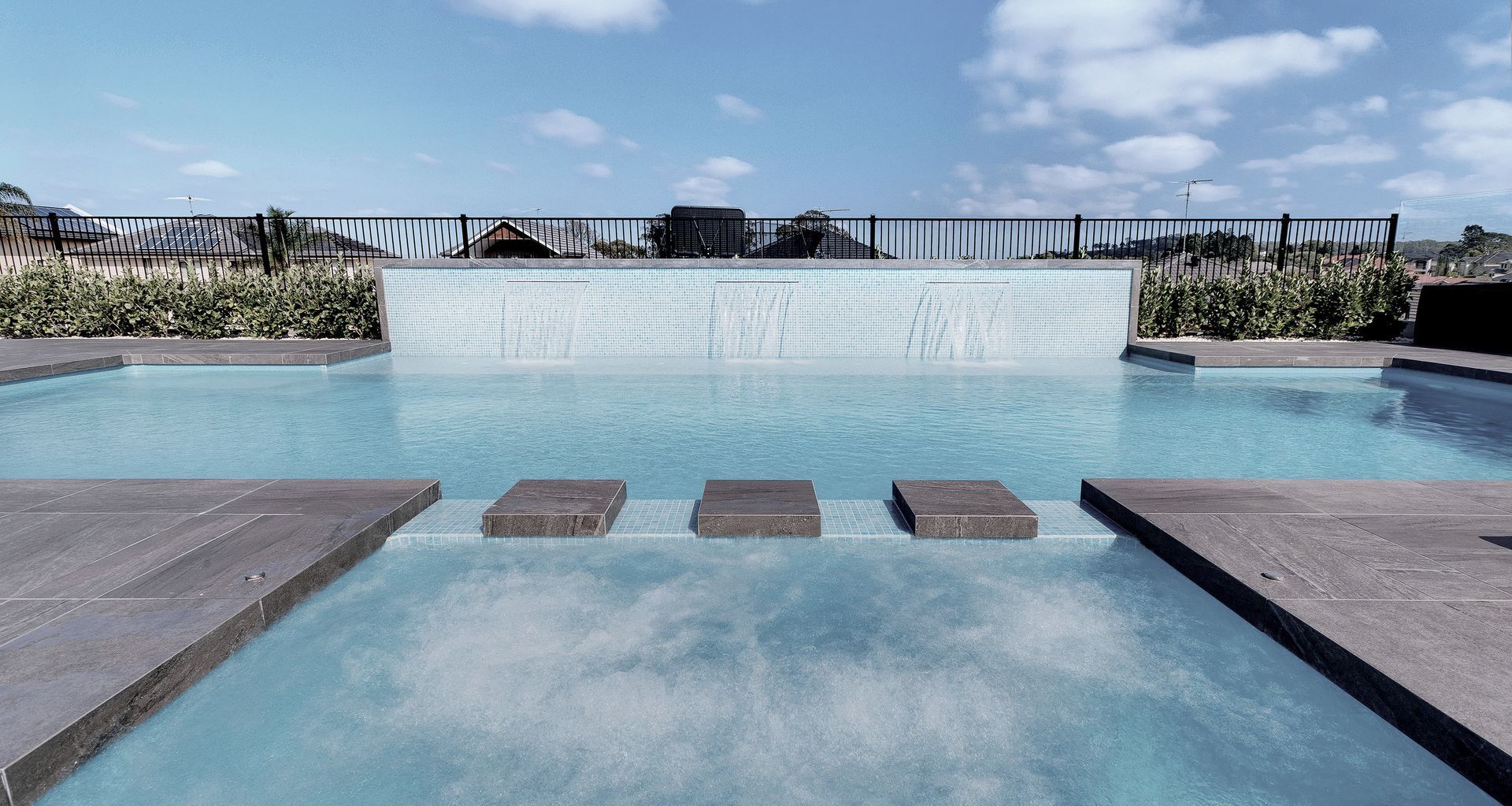Fibreglass Pools Vs Concrete Pools

Let’s take a look at the benefits of a fibreglass pool…
- Fibreglass pools are quick to install: A standard installation only takes about a week (whereas a concrete pool can take weeks or months), this is because the majority of the pool is constructed in the factory before it gets to you.
- They are visually appealing: Some pool manufacturers invest a lot of time and resources into creating their fibreglass pool surfaces, and the result – a stunning pool with the WOW factor.
- They are easy to clean: Fibreglass pools are easy to care for because of their smooth gel-coat surface. This surface makes it difficult for algae and bacteria to grow, making them cleaner and healthier – this also means they are easier cheaper to maintain as you spend less time and money keeping it clean.
- Fibreglass pools are low maintenance: If you follow the manufacturer’s guidelines of basic care, your pool will stay in great condition, and unlike a concrete or vinyl-liner pool it shouldn’t need resurfacing or repainting during its lifetime.
- The water is warmer in a fibreglass pool: People that have owned both a concrete and a fibreglass pool claim their fibreglass pool is warmer – they heat up quicker and stay warmer for longer.
- Fibreglass as a building material is extremely strong: Fibreglass is a reliable material and most pool manufacturers provide an extensive warranty period. Fibreglass is super strong, and quality manufactured pools have the added benefit of being both flexible and strong.
The Compass Pools patented ceramic composite technology creates enhanced strength, durability and chemical resistance – see the final section of this article for more about this.
Are there any downfalls of a fibreglass pool?
There are limited shape and size options: Fibreglass pools are made in the factory before they get to your house, so there are a set range of shapes to choose from. These shapes are also limited by size (the width in particular) as they need to be able to be transported on the road, for example, the widest Compass Pool is 4.2m wide.
However in saying that, you’ll find that most manufacturers have a fairly wide selection of shapes and sizes available and you
should easily find a pool that suits your needs. Ask your Compass Pools dealer about our unique customisation service where you can build beach entries, swim-outs and lounge areas into your pool design.
Now let’s look at the benefits of a concrete pool…
- You can choose any shape or design: The main benefit of a concrete pool is being able to have any shape or design your heart desires. Your pool builder can tailor your design dreams to suit your space, as it’s all built on-site.
- They look great: A new concrete pool looks very attractive, plus depending on your budget and tastes you can choose the finished surface, and there are a range of options from pebble to tile.
- Concrete pools are strong: There’s no doubting that concrete pools are structurally strong, people have been building them for years and they last through generations.
What are the downfalls of a concrete pool?
- A concrete pool takes much longer to build: A concrete pool is constructed on-site from start to finish, and this can take a number of months, whereas other types of pools can be completed in just a few weeks.
- They can cost a lot more to build: The cost of your pool starts to increase as the design becomes more complex, with endless options to customise your design that can happen quite quickly.
- A lot of the popular surfaces are rough on your skin: A common grumble with concrete pools is the rough finish of the surface and how hard it can be on bare skin – kids are more active and boisterous in the pool so can often end up with grazes and scrapes.
- Daily running costs are higher: Because concrete surfaces are more porous, algae and bacteria grow and breed much easier. This means more of your money and time is required to keep your pool clean and healthy to swim in.
- Concrete pools are prone to black algae: Once black algae gets into the pores of your pool surface it is almost impossible to get rid of completely.
- The ongoing care and up-keep is expensive: There is a certain amount of ongoing maintenance required with a concrete pool. Quite a costly aspect of that maintenance is repainting or resurfacing your pool – which you need to do every ten to fifteen years.
The choice is yours - which way will you go?
When you sit back and look at the pros and cons you can see that there are plenty of benefits with a fibreglass pool. They are strong and durable, they look great and are much easier and cheaper to care for than a concrete pool. Concrete pools however are more adaptable in terms of size and shape.
Are all fibreglass pools created equal?
In short, no. The majority of manufacturers produce reliable and robust products, but there a few that stand out from the crowd. One distinct difference is the use of Ceramic Composite Technology (CCT). Compass Pools developed and patented CCT in the mid 90’s, it is now used throughout all dealers of Compass Pools in Australia and New Zealand. Similar technology is also being used by Aqua Technics (in Western Australia and NZ) and Viking Pools (in the Northern Territory of Australia) and other major manufacturers in the United States.
The reason Ceramic Composite Technology sets a Compass Pool apart from any other fibreglass pool is it creates a super strong core in the pool’s shell. This gives the pool structure superior durability which means it can cope better with ground movement, changes in soil conditions and groundwater pressure (caused by severe weather).
